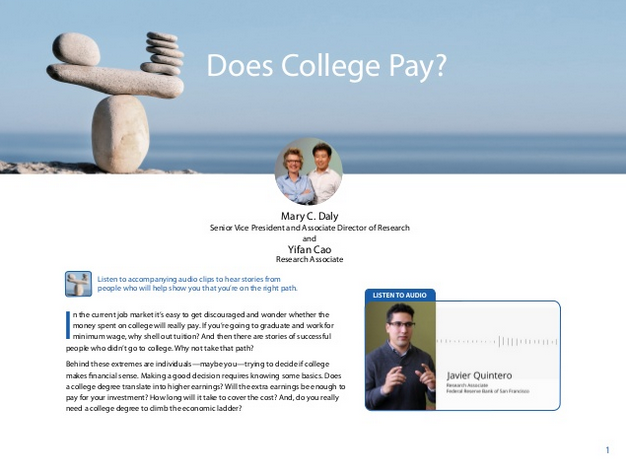With tuition costs on the rise, casting doubt on the value of a four-year degree has become a
national pastime. Look beyond the hype and at hard data, though, and you’ll find it still pays
to pursue a college education. Mary C. Daly, SF Fed Associate Director of Research, crunches
the numbers in our 2014 Annual Report, Does College Matter?
In the essay she co-authored with Research Associate Yifan Cao, Daly explains, “College is an
excellent investment for most people. A college degree comes with higher earnings, some
insurance from the ups and downs in the economy, and a path up the economic ladder.”
Download the Does College Pay? essay (pdf, 390.41 kb)
On average, it takes about 15 years to recover the cost of attending most colleges. And a premium degree isn’t necessary for a student to reap long-term economic benefits; in fact, research finds no definitive evidence that higher tuition leads to superior earnings for all students.
In 2011, the average worker with a college degree earned about $20,000 more per year than the average high school student. Daly and Cao predict the college premium is likely to become even more important as time goes on, writing, “Employers are looking more and more for workers with established skills and credentials. And the well-educated baby boom generation is nearing retirement, which will leave high-skilled positions vacant and increase the demand for college educated workers.”
To estimate your own tuition ROI timeline based on anticipated college expenses, visit our Is
College Worth It? calculator. And if you need more inspiration, tune into the Does College
Matter? podcast, playing now on Stitcher and iTunes. We talk with a diverse group of
experts, entrepreneurs, and college students, including Daly, who went from GED to PhD
with the help of scholarships and grants.
You may also want to read:
The views expressed here do not necessarily reflect the views of the management of the Federal Reserve Bank of San Francisco or of the Board of Governors of the Federal Reserve System.

